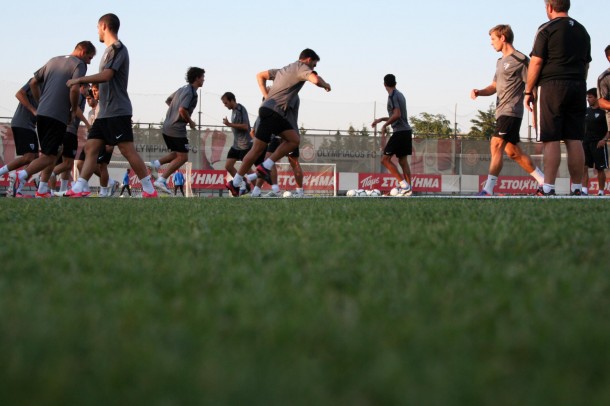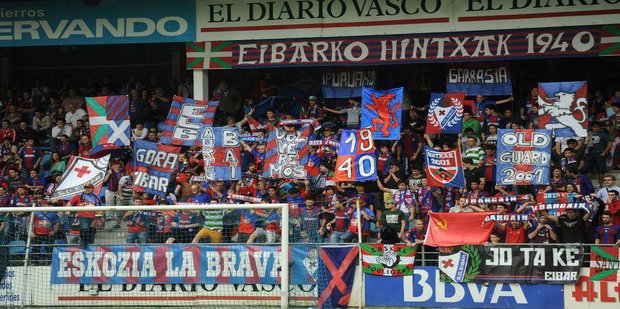- S.D. Eibar ready for maiden La Liga outing
- SD Eibar stengthen ahead of debut La Liga season
- Can ‘Super Mario’ live up to expectations in Madrid?
- MAN IN THE GROUND – Brentford 0 – 4 Osasuna
- Historic Basque derby welcomes S.D. Eibar to La Liga
- Munich to Madrid, via Brazil – Tony Kroos
- Rakitic in Spanish Switch
- Can Spain find redemption in Rio?
- Viva Espana! A season of redemption for Spanish football
- From the old to the new: who can fill the void in years to come for La Roja?
Malaga’s downfall could accelerate La Liga’s own demise
- By Lee Roden
- Updated: 8 August, 2012

 Spanish football is many things, but simple isn’t one of them. Whether that’s in terms of the style of play or the politics behind it all, one thing you can expect from La Liga is that it’s complicated. For that reason, the way in which Malaga’s dream has distorted into a nightmare over the course of this summer should have surprised no one, but admittedly in the case of the author, it did.
Spanish football is many things, but simple isn’t one of them. Whether that’s in terms of the style of play or the politics behind it all, one thing you can expect from La Liga is that it’s complicated. For that reason, the way in which Malaga’s dream has distorted into a nightmare over the course of this summer should have surprised no one, but admittedly in the case of the author, it did.
The thing is, the beautiful game in Spain has a nasty habit of taking everything you thought you knew to be true about football and turning it on its head. As naive as it may be, the majority of football fans probably like to think they adhere to the principle of building a home-grown team=good and buying a team=bad. Of course, it’s never that simple, but none the less, in general it’s for this reason that public perception has Barcelona down as one of the ‘goodies’ in world football (despite them blowing an absolute fortune on worthless signings on countless occasions), and Real Madrid as a ‘baddy’ (despite some of their greatest ever players only achieving their best football once they graced the Bernabeu). It would seem then in this context that Malaga would fall into the latter category, except in a further complication, they don’t.
Despite millions being pumped into the humble Andalusian side in an attempt to fast-track them to domestic and European glory, and despite the fact that teams with half of their resources were eventually bulldozed out of the way in Malaga’s quest for fourth place last season, there was a general feeling that, since the project began, the neutral was actually rooting for, not hoping for the downfall of Los Boquerones.
The reason comes down to the merciless dominance of Barcelona and Real Madrid. While many will rightly point out that other leagues experience a dominant two or, at best, three teams, in very few of those examples is the financial distribution to the powerful clubs in comparison to the teams in the middle-ground so lop-sided as is the case in La Liga. The fact is, short of a Qatari billionaire throwing his weight behind a smaller Spanish side, as appeared to be the case with Malaga, no team had, or has, a chance in hell of toppling Barcelona or Real Madrid in the near future.
As such, when Malaga pulled off the first stage of their grand plan ahead of schedule, finishing in a Champions League position at the end of the 2011/12 season, there was a genuine feeling of optimism that Spain’s top-flight was finally heading ever-closer to a new era of competition. Three teams competing for the biggest domestic prize still isn’t really enough, but it’s 50% more than the status-quo, and that’s a good start. A palatable prospect for the neutral observer.
It didn’t work out that way of course. Malaga should have been using this summer to strengthen their team, instead they’re using it in an attempt to simply survive. Santi Cazorla’s departure to Arsenal isn’t just a blow in terms of the loss of quality it will cause at Malaga, it’s also a symbolic blow. It turns out Malaga’s new owner was constructing nothing more than a sandcastle, and it’s about to crumble.
So too crumbles any hope of a new dawn in La Liga, and at the same time Spanish football’s day of reckoning edges ever closer. A two-team league is not a sustainable league, certainly not for a competition which aims to compete with one of the best marketed products in the world in the form of the Premier League. As the gap continues to widen, you can guarantee that, as soon as Barcelona and Real Madrid’s European performances or global reach begins to suffer as a consequence of the lack of real domestic competition, the two giants will consider their options elsewhere. Whether that’s in the form of the much ridiculed (but scarily realistic) European superleague no one knows, but it doesn’t bode well for the other teams in Spain.
The problem doesn’t just extend to Spain’s top-flight. If La Liga often looks to be ran by fools, La Segunda is almost provincial. The fact that thousands were willing to pay to see Barcelona train in second division Girona’s stadium this week, when only 700 people turned up days prior, completely free of charge, to watch the local team play a pre-season game, says a lot. I’m no expert on the English Championship, but I’ve yet to see a gate of 700 free entrants for a match in England’s second tier.
The sad thing is, Barcelona and Real Madrid could put paid to this problem whenever they like. Should the two renegotiate their TV deal for a more balanced distribution of wealth, not only would they be giving something back to a league they’ve taken so much from, but they would also benefit from the newfound level of competition that would follow. If money is all that matters, La Liga as a product would likely grow too, and in an environment where money is spread fairly to all teams involved, that’s good for everyone.
I’m not holding my breath however. Whether it’s in the form of Barcelona, who despite all their charitable endeavours, could do with being generous closer to home sometimes, or it’s Real Madrid are a little more honest about the wealth they’ve exploited, neither of the two are likely to change their deal with the devil before their hand is forced. By then it might be too late. Spare a thought for Malaga, they’re not the only team in Spain that’s going to suffer in the near future.
Follow @icentrocampista
Related Posts
9 Comments
You must be logged in to post a comment Login






Pingback: Malaga’s downfall could accelerate La Liga’s own demise – El Centrocampista
Pingback: Real Madrid overtake Barcelona on Goal.com 50 & could now become Spain’s … – Goal.com
Pingback: Real Madrid overtake Barcelona on Goal.com 50 & could now become Spain’s … – Goal.com
Pingback: Mourinho predicts closer title race – SuperSport (blog)
Pingback: La Liga clubs’ financial problems are compounded by the dominance of … – GiveMeFootball.com
Pingback: Real Madrid and the 10th Champions League trophy – Part 1 – bettor.com (blog)
Pingback: Who are La Liga's biggest losers i the summer of discontent | elcentrocampista.com - Spanish Football and La Liga News in English
Pingback: La Liga around the web | elcentrocampista.com - Spanish Football and La Liga News in English
Pingback: Morbo Minute–Kickoff 2012/13 | Blaugrana Fan